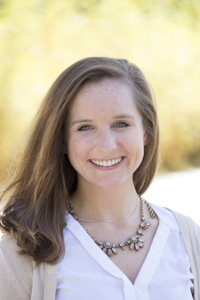
USC plastic surgery resident Meghan McCullough is leading research and education projects around the world for Operation Smile as the newest Tsao Global Surgery Fellow. (Photo/Larissa Puro)
In her sophomore year as a pre-medical student at Harvard University, Meghan McCullough faced a life-changing career decision: to train for a chance of pursuing her dream of making it to the Olympics or fulfill her long-held ambition of becoming a doctor.
It was heartbreaking, she said, to retire from ice dancing — a passion that began at age 4. But at 21, McCullough’s decision led her to where she is today: a USC plastic surgery resident and Tsao Global Surgery Fellow.
“I was one of those strange people who, from an early age, it just kind of clicked,” she said. Not only did she know she wanted to be a doctor, she wanted to be a plastic surgeon. “It was a good combination of my natural aptitude in science and my love of art and sculpture and working with my hands — and then just the desire to help people.”
Her years of ice skating training taught McCullough valuable skills that translated well to the grueling surgery lifestyle. She was already accustomed to managing her time efficiently, functioning on little sleep and being receptive to feedback.
“Surgery becomes very much a coaching kind of learning environment,” she said.
In college, McCullough took a freshman course with Paul Farmer, MD, PhD, in medical anthropology, which sparked an interest in global health and connected it to plastic surgery.
“It opened my eyes to how communities look at their ill and deformed and how they create these roles for them that get perpetuated” through shame, fear and rejection — especially in children with craniofacial disorders, she said. “A lot of the kids in these communities have so many other things they have to overcome. It seemed like the very least to give them chance to face the world.”
After graduating from college, the Washington, D.C., native took a gap year before starting medical school at Emory University. She traveled to Peru and Guatemala on surgical mission trips with various surgical organizations and spent several months volunteering for Project HOPE aboard the USNS Mercy, a U.S. Navy hospital ship. Then, for six months, she worked on Capitol Hill for the HIV/AIDS advocacy organization amfAR — an experience she said was an interesting contrast to the fast-paced, fix-it mentality of surgery.
That gap year highlighted different aspects of medicine and exposed her to a new perspective of surgery as a public health tool to combat disease around the world. It also showed her the importance — and frustrations — of policy work to enact change.
She chose USC for her plastic surgery residency in part because of its Tsao Global Surgery Fellowship, organized by Children’s Hospital Los Angeles, Operation Smile and the USC Institute for Global Health.
“What’s really special about USC is they have this two-year program that really gives you the time to immerse in the experience and come to appreciate all the cultural, social, political and economic factors involved global surgery work — and the time to do quality research,” she said. In 2016 she became the program’s fifth fellow since it began in 2010.
The program’s fellows develop academic, clinical and administrative skills in global surgery, clinical and public health research, and humanitarian aid in resource-poor settings. In addition to gaining master’s degrees in clinical and biomedical investigations, they conduct research and travel around the world to where Operation Smile carries out surgical care missions.
The goal, McCullough said, is to gain new skills not just on a surgical level but on an organizational level — as a leader.
“I came in and was so excited to go on my first mission trip right away and start doing surgery,” she said. But it became clear that there was much more to consider. “It was a lot more about taking a step back, like ‘Let’s think about the research projects: Where are the gaps? How can we help?’ ”
That was a good lesson in global health, she said. “You want to jump into the mission — and that’s the glamorous part of it — but it takes a lot more thought and planning to really make a difference.”
Now, with her residency on hold between her third and fourth year, McCullough is juggling classes, travel and several research projects. It’s no vacation from the structured rigor of residency, she said. In fact, “it was really kind of like jumping into the deep end of the pool.” But the self-driven fellowship is “a nice change of pace,” offering her the freedom to guide her own work.
The projects she leads are both new and continued from previous fellows. “That’s another really positive thing about USC — that we have this continuity,” she said, so the projects don’t get dropped when fellows move on. “Research doesn’t get done in a neat two-year package.”
Right now she is working on a cleft lip and palate severity index using an iPhone application to better standardize discussions about cleft disease, help guide treatment decisions and improve conversations with families. Another project focuses on building surgical capacity in Vietnam through adaptation of the World Health Organization safe surgery guidelines. In addition, she is helping to develop Operation Smile’s educational curricula.
“It’s not a model where doctors just come in and do surgery and then leave — which some other groups do,” she said. “There is a concerted effort to train new surgeons and strengthen the existing surgical workforce, to empower these communities to achieve sustainability in the care of their patients.”
Next up, McCullough plans to travel to Nicaragua, Morocco, Madagascar, Vietnam, Bolivia and India to follow up on research and attend conferences. Long-term, she said, she plans to specialize in pediatric plastic surgery and hopes to continue her global surgical work with organizations like Operation Smile.
— Larissa Puro

